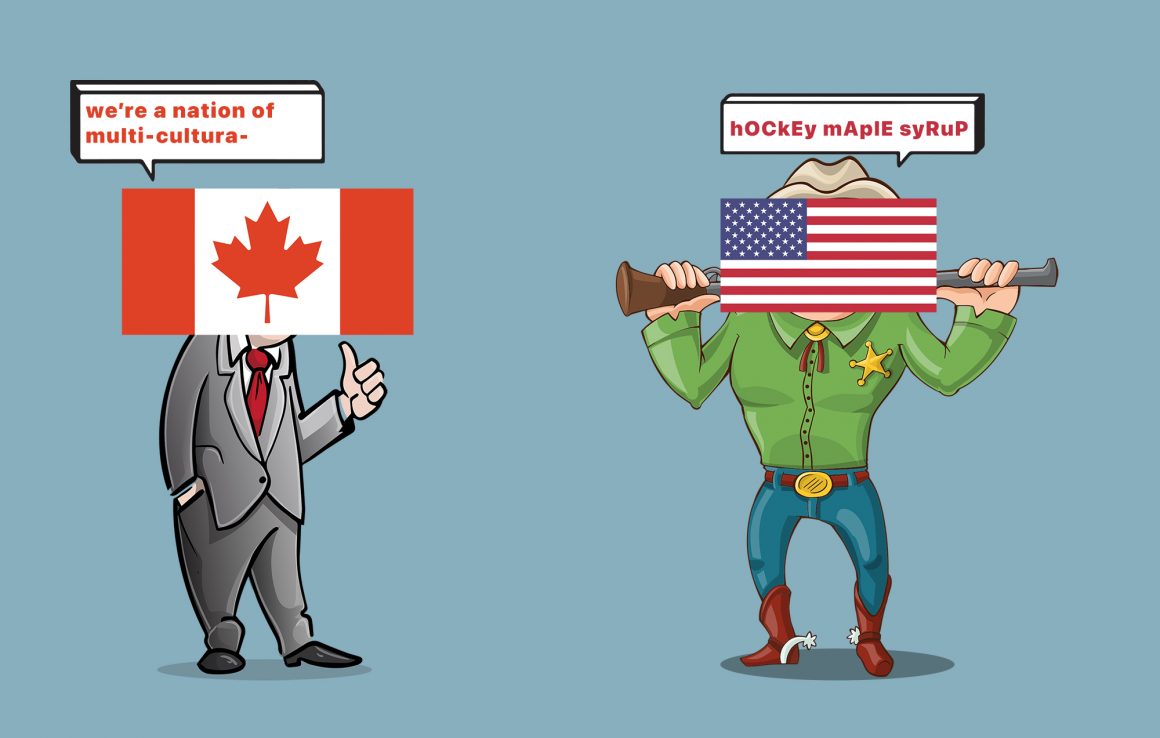
The myth of Canadian identity
By Zal Dholoo, June 6 2023—
The Canadian identity — like every national identity — is largely a myth and in the era of social media, it has become increasingly irrelevant. The Canadian identity has been largely supplanted by the American identity, but what can be done about this?
Myths are stories which offer some deeper insight into some facet of the human condition, often taking the form of a didactic parable with some moral teaching. For example, in the case of the tortoise and the hare: dogged persistence and hard work triumph over innate talent and lack of effort. In the case of a national identity, a myth offers a short-hand of what to expect when meeting someone of a different culture, or what to expect of a country when travelling. Today, where the experience of another human on any part of the planet is more accessible than ever if anyone truly wanted to know the experience of another person, it is only a handful of seconds away. However, in the age of information, heuristics — defined as mental shortcuts such as myths — are not replaced by information, instead, heuristics guide information gathering and are often our first line of reasoning.
The pillars of Canadian identity take many forms, but I define them as being a more left-wing version of America, and open-hearted acceptance.
Canadian identity has become tied to the American identity. This is irrefutable, if you were to argue that Canada is unlike the U.S. because we have public healthcare, you would still be defining Canada by contrasting it to the U.S. thereby connecting countries which have vast ethnic, demographic and geographical distinctions. Nevertheless, due to our geographical proximity and the nature of America as a hegemon, Canada has largely been defined in relation to its neighbour to the south. However, in the age of the internet, it is no longer unique to be similar to American culture. A facet of Canadian identity, its unique differentness, becomes something which aids in subsuming Canadian culture into the cultural monolith of America.
The second pillar that I have proposed, our supposed or viewed moral superiority was borne not of a deep and historic understanding of Canadian history, instead, it was borne of ignorance. Canada may have been more active in outlawing slavery, but Canada still has a storied and documented history of participating in and trading slaves prior to the early 17th century. More importantly, though Canada was the first commonwealth nation to ban slavery, its moral failings were equally damaging. Canada began the institutionalized erasure of the Indigenous populations who lived in the land which became Canada in the late 17th century. This only came to an end recently, with the last privately run residential school closing in 1997, and the last publicly run residential school closing in 1996. When you are defined by your open-heartedness and it turns out that the state could not integrate the Indigenous peoples into society, and instead stripped them of their identity, it seriously calls into question this pillar of the Canadian identity.
This leaves us with both pillars of the Canadian identity tarnished and as a result, we see a Canada that is trying to rediscover itself. Canadian identity is increasingly thought of as a place on a map rather than a collection of vibrant and beautiful people. It does not have to be this way, Canadian identity in the 21st century should be built on those who have built Canada, migrants. Canadian identity should be built on the idea that a person, of any origin or background can become Canadian. This is what the original pillar of open-hearted acceptance originally stood for, and there is no reason it should not continue to stand. But this pillar should be amended to be combined with a willingness to change, to accept the sins of the past and work to create a better future, much like people who are seeking new opportunities in this country.
I propose that a Canadian identity should be built on open-hearted acceptance and a willingness to accept failure and change course for the better.
Matters of Canadian identity are of major importance to lawmakers in Ottawa, so we have seen endeavours such as Bill C11, now known as the Online Streaming Act. Lawmakers are eager to legislate a Canadian identity back into reality. Legislature like this has little effect on the Canadian identity. It simply ensures that the same restrictions that were in place for televised media, would apply to online media. This means that Canadians get shown more Canadian content. Legislature like this has little effect on cultural identity because the issue of Canadian national identity is not one of a lack of Canadian content, but rather an erosion of identity as times have changed. Governments do not create identity, though they can curate it, the Canadian national identity is principally created by repeated action by any Canadian.
Whether that be the actions of heroes such as Roméo Dallaire, Chloe Cooley, and Frederick Banting, the tired but well-mannered tourist with the proud Canadian flag lapel pin, or the kind actions of local Canadians to a new migrant family, student or tourist. These are actions which create a national identity, repeated action through a belief in a shared vision of a community of people. By contributions by people like you or me, to create a Canadian identity we can once again be proud of.
This article is a part of our Opinions section and does not necessarily reflect the views of the Gauntlet editorial board.
